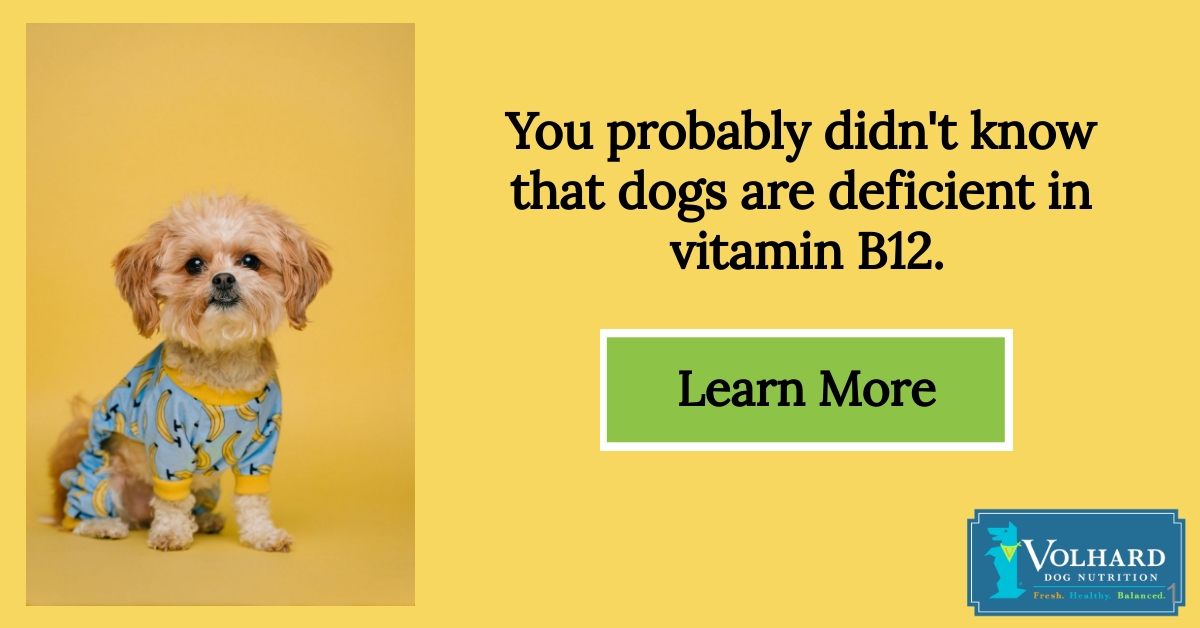Part II: How Important Vitamin B12 is for Your Dog's Diet
Posted by Volhard Dog Nutrition on Aug 14th 2020
Here at Volhard, our mission is to make sure that dog owners know how to care for their canine friends adequately. As a dog owner, you know that a species appropriate fresh, natural diet, rich with essential nutrients, is the foundation for your dog’s happy and healthy life. For this reason, we took it upon ourselves to educate dog owners on the value of the essential nutrients that constitute the proper raw diet for dogs. Vitamin D, B12 (Cobalamin), Magnesium, and Calcium are critical components of biological function. These 4 essentials are intimately involved with numerous pathways from enzymatic reactions and DNA synthesis, fatty acid/amino acid metabolism, innate immunity, the anti-inflammatory cascade, cellular differentiation, and many more. As dietary derived vitamins, these should be evaluated given the varied diets and typically poor diets of many of our pets.
Our last blog post focused on the omega-3 fatty acids. As we have seen, omega-3 can help prevent and treat numerous dog illnesses, such as cardiovascular and digestive ones. In this blog post, we’re going to take a closer look at another fundamental ingredient for a superior natural diet for dogs: Vitamin B12 !
What is Vitamin B12 And What Does It Do for Dogs
Vitamin B12 is one of the vitamins essential for your dog’s healthy growth. With its nutritious attributes, vitamin B12 plays a critical role in the dog’s overall cell system, with a particular accent on the nervous system, cell growth, protein synthesis, fat and carbohydrate metabolism, and the formation of red blood cells. Since the bodies of mammals are unable to synthesize this vitamin , your dog relies on a proper nutrition plan to receive its necessary vitamin B12 intake.
As we have seen, the B12 vitamin must be a part of every dog’s nutrition plan, which is why the Volhard Natural diet is working to ensure the right intake for your dog’s needs.
How Much Vitamin B12 Can I Give My Dog
Now that we know the importance of the B12 vitamin, it’s time to discuss proper intake. B vitamins are water soluble vitamins and “it is flushed through the body quickly and cannot be stored, and must be fed to the dog with each meal” according to Wendy Volhard in the Holistic Guide for the Healthy Dog . With that said always remember that everything taken in excess can become harmful to the body. In all dogs, the pancreas plays a vital role in the extraction of B12 from food. Before flooding your dog’s diet with foods rich with vitamin B12, make sure that you take your canine friend to a vet clinic for a blood test. The vet will analyze your dog’s blood sample and discover the vitamin B12 amount already present in your dog’s blood. Based on this information, the vet can determine the right vitamin B12 intake for your canine friend!
Benefits of Vitamin B12 for Dogs
Now, let’s go back to the benefits brought by proper vitamin B12 intake. As we have seen, there is no aspect of your dog’s life left untouched by this vitamin! That is because most of the benefits brought by this vitamin are linked to the cell system.
Starting from the nervous system, vitamin B12 helps to create and improve the protective tissues that coat the nerves in the brain, providing the dog with superior control over all physiological functions. Additionally, a healthy nervous system benefits the spinal health of your dog.
Furthermore, another benefit of the B12 vitamin resides in the production of red blood cells. Ensuring a sufficient amount of red blood cells in your dog’s blood will help your canine friend to distribute oxygen and nutrients throughout its body in an effective manner.
Lastly, proper vitamin B12 intake is essential for dogs who generally have a hard time absorbing this vitamin into their blood systems, such as Border Collies, Beagles, and Giant Schnauzers. Working the B12 vitamin into your dog’s diet will help prevent diseases such as exocrine pancreatic deficiency (EPI), which impairs your dog’s pancreas from producing the required enzymes for food digestion.
Something to think about: “Vitamin B12 also affects the interactions among bacteria living in the gut microbiome, and an unbalanced gut microbiome may be at the root of a B12 absorption problem” according to animalbiome.com
Vitamin B12 Deficiency in Dogs
We have seen how a proper species appropriate diet , rich with nutrients such as vitamin B12, can improve your dog’s health and bring the peace of mind it deserves. With peace of mind comes not only a healthy life but also a beautiful relationship between you and your canine friend. But what happens when your dog’s nutrition plan does not include a proper vitamin B12 intake or your dog is not able to use the vitamin B12 in the diet? Most dogs get plenty of this nutrient from their food. B12 is found in meat (especially organ meat), fish, poultry, eggs, and dairy products. In a healthy dog, the pancreas, intestines, liver, and kidneys are all needed to properly absorb and store this B12. But in a sick dog, one with Inflammatory Bowel Disease (IBD), or pancreatic issues where one or more of these organs may not be able to do its part, ultimately can cause a deficiency.
Vitamin B12 plays an essential role in the body’s absorption of iron. Without iron, your dog’s immune system weakens, which, in turn, can lead to anemia. Look for the following symptoms if you think your dog might be suffering from vitamin B12 deficiency:
- lethargy
- visible loss of energy
- lack of appetite
- loss of muscle mass
- change in eating habits
While these symptoms don’t pose an immediate threat to your dog’s life, a prolonged vitamin B12 deficiency can lead to more severe problems, such as gastrointestinal diseases, weight loss, and seizures.
Sources of Vitamin B12 for Dogs
You now understand every aspect of vitamin B12 and appreciate its positive effects on your dog’s happiness and well-being. If you’re looking for foods rich with vitamin B12, look no further: switching to a fresh, natural diet such as the Volhard AM/PM or NDF2 diets provides B12 and other B vitamins through the following whole food ingredients: Molasses, eggs, liver, yeast, wheat bran, wheat germ and kelp. This is one of the best solutions for your dog’s nutrition plan! Your dog will be getting plenty of Vitamin B12 from organ meat and different other products, such as eggs, yoghurt, goat milk, and fresh raw or lighty cooked muscle meat. If you would like to improve your current diet by adding plants, then seaweed is your best choice.
We realize that you might not be ready for a fresh diet, so we made it easy to add B vitamins using the Volhard Vitamin B Complex supplement is our top recommendation!
Conclusion
There’s no doubt that Vitamin B12 must be a part of your dog’s nutrition plan. Are you ready to further improve your dog’s well-being and happiness? Make sure to read our next blog post for more valuable tips and hints or check our other blog posts!



